Sergio Gutiérrez Negrón's Blog, page 35
June 9, 2012
the topos called the market, dixit Levinson
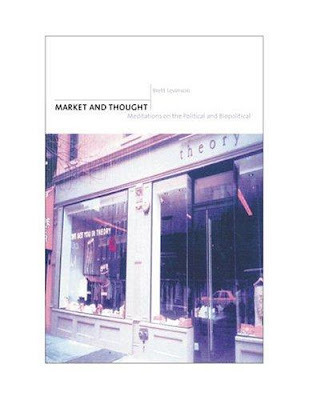
Because it [the nihilism of the market, of neoliberal
consensus], first, adopts the signifier and representation, thus mutability and
diversity as its ground, and, second, distinguishes these from the signified,
immobility, imposition, and unity—because it demands that intellectuals, like
shoppers, choose from the signs before them, assume their proper place in the order of representation, thereby support
unawares a market arrangement whatever discourse or idea they select—because of
all this, the linguistic turn tends to ‘sweep right by’ saying as the counter to the ‘it goes without saying’ of consensual
postdemocracy. Our concern for language, to repeat, lies here: in saying this
topos which runs most efficiently without any saying, indeed, which makes all
saying increasingly difficult or scarce even as it creates avenues for more and
more voices—to wit, the topos called ‘the market’.
Market and Thought:
Meditations on the Political and Biopolitical, de Brett Levinson.
Published on June 09, 2012 08:28
May 25, 2012
we graft the other onto us, says bazzicalupo
This is crucial. Neither biology nor anthropology can sketch the essence of the before the constitutive relationship with what is outside, to that which opens to our animality or vitality as "opening" and "feeling". It is aesthesis: the active reactivity or receptive-transformative passivity that depends on that which is other from the self. To the extent that it is dependent (and therefore removed from a divinely created and inauthentic mode of being), the human draws mimetic forms. It is therefore technique; it is art as artifice [see Bazzicalupo]. This implies a rethinking of identity as constitutively not insular: as metisse, as hybrid, and paradoxically as always cyborg. Our capacities for life are [our] capacities for artifice, for putting ourselves in relation to that which is other from us: the human is not a given, but that which can be modified. We graft the other onto us inasmuch as we are capable of assimilating and metabolizing it. By virtue of this, the corporeal doesn't dissolve into the virtual or the technological, because body and life represent an active passivity, the mnestic and selective features of that creative assimilation.
Laura Bazzicalupo, "The ambivalence of biopolitics".
diacritics, Volume 36, Number 2, Summer 2006
Published on May 25, 2012 17:05
May 10, 2012
do you dream often, they asked, their faces the shape of dehydrated tortoises
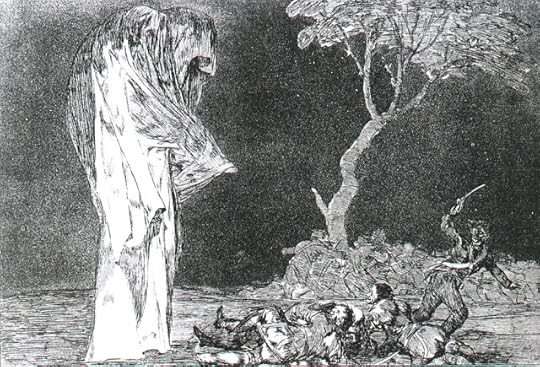
Goya, Disparate número dos
They came up and they asked, do you dream often? And I said, of course I don't, even if I was precisely asleep at that moment. They shook their heads, and started walking away, dismissing me completely, dismissing me like a three-legged cat is dismissed on a black sabbath. What could I have done, if not just run after them, call out their names, which I didn't know yet, and yell, cry, plea for them to give me one more opportunity. I wouldn't lie this time around, I sniffled apologetically, but they wouldn't give me the time of day, the time of night, they wouldn't give me time, period, and that's what I needed, because I could hear the alarm clock's bray on the other side of the placenta, and I was suddenly certain, positive, genuinely and indisputably confident, like you can only be in the subjunctive of dreams, that what they had to say carried a truth, no, the truth of that singular instant. When they finally stopped, and turned around, with faces the shape of dehydrated tortoises, they uttered--in a language so mine that it escaped me completely--a whisper (can a whisper be uttered?), and I realized that that was it, that that was all there was, stepped back, let myself fall, fall on my ass, fall on my body, fall awake: calm, so calm, so placid and serene. My bed was so soft. The fan was going about its rounds. The upstairs neighbor was stomping her feet.
A song. What was that song?
Published on May 10, 2012 06:11
May 9, 2012
why this body, this world, asks nancy
Why is there this thing, sight, rather than sight blended with hearing? And woult id make any sense to discuss such a blend? In what sense? Why this sight, which doesn't see infrared? This hearing, which doesn't hear ultrasound? Why should every sense have a treshold, and why are senses walled off from each other? Further still: aren't senses separate universes? Or else the dislocation for every possible universe? What's the disjunction of the senses? And why five fingers? Why that beauty spot? Why this fold at the corner of the lips? That crease, there? That appearance, this gait, that restraint, this excess? Why this body, this world, absolutely and exclusively this one?
--Corpus, Jean Luc Nancy

--Corpus, Jean Luc Nancy
Published on May 09, 2012 14:17
May 8, 2012
May 7, 2012
la escalera
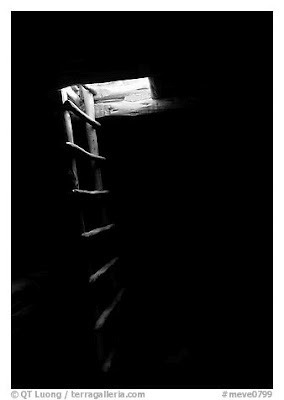
La escalera se torció frente a él. Se hizo
un espiral, una chorrera, un torbellino hecho de pequeñísimas vorágines
ansiosas por consumirlo; y, al otro lado, llovía. Llovía un aguacero frío, aguacero
hecho para darle fin al espeso calor que humedecía impregnablemente esas ocho
de la noche. Llovía y él en chancletas, y él allí, frente a ese escalón, con
todo puesto en su contra, a sus espaldas un espacio cálido, a sus espaldas una
opción, un hueco que apuntaba a otra vida, pero insistía en la escalera, y esa
insistencia surgía de su piel, no de un supuesto interior, pero sino de una
pulsión en su piel que declaraba su existencia por primera vez, y, en su voz
neonata le ordenaba a descender, a saltar, a desperdigarse por aquél
acantilado, a alimentar el sinnúmero de fauces que esperaban, impávidas, por su
banquete, por esa oportunidad de devorar las temporalidades paralelas que
surgirían tan pronto él tomase la decisión. Y lo hizo. Dio el paso. Bajó la
escalera casi corriendo. Abordó el automóvil.
Por la algarabía de la diluvio,
no escuchó la puerta cerrarse detrás de él.
Published on May 07, 2012 16:27
May 6, 2012
Fotografía de Alvin Ailey, de http://www.blackarchives....
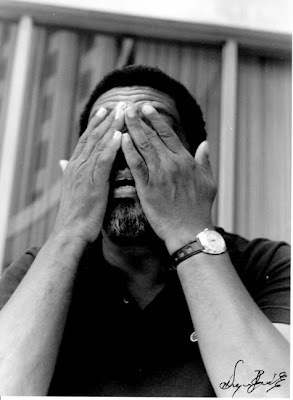
Fotografía de Alvin Ailey, de http://www.blackarchives.org/nove/595
Le pedí a mi padre, le dije, "Padre, cámbiame el nombre, el que estoy usando ahora está embarrado con miedo y sucio y cobardía y bochorno".
Él me dijo, "te encerré en ese cuerpo. Lo hice como un tipo de prueba. Lo puedes usar como un arma, o lo puedes usar para hacer a una mujer sonreir".
"Entonces, déjame comenzar desde cero", rogué, "déjame comenzar desde el principio, quiero un rostro que sea justo esta vez, quiero un espíritu que esté calmado".
"Yo nunca miré para el lado," respondió, "Yo nunca les di la espalda. Fuiste tú que construiste el templo. Fuiste tú que cubrió mi rostro".
[Lover, lover, lover, de Leonard Cohen]
Published on May 06, 2012 10:45
April 29, 2012
for a new age of curiosity, dixit Foucault
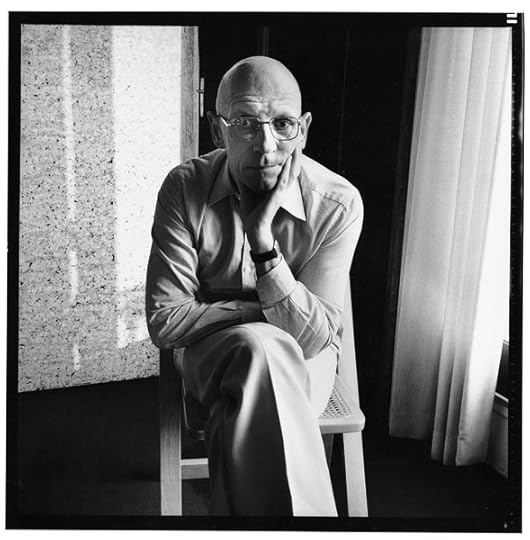
No, I don't subscribe to the notion of a decadence, of a lack of writers, of the sterility of thought, of a gloomy future lacking in prospects. On the contrary, I believe that there is a plethora. What we are suffering from is not a void but inadequate means for thinking about everything that is happening. There is an overabundance of things to be known: fundamental, terrible, wonderful, funny, insignificant, and crucial at the same time. And there is an enormous curiosity, a need, a desire to know. People are always complaining that the mass media stuff one's head with people. There is a certain misanthropy in this idea. On the contrary, I believe that people react; the more one convinces them, the more they question things. The mind isn't made of soft wax. It's a reactive substance. And the desire to know [savoir] more, and to know it more deeply and to know other things increases as one tries to stuff peoples' heads. If you accept that, and if you add that there's a whole host of people being trained in the universities and elsewhere who could act as intermediaries between this mass of things and this thirst for knowledge, you will soon come to the conclusion that student unemployment is the most absurd thing imaginable. The problem is to multiply the channels, the bridges, the means of information, the radio and television networks, the newspapers. Curiosity is a vice that has been stigmatized in turn by Christianity, by philosophy, and even by a certain conception of science. Curiosity is seen as futility. However, I like the word; it suggests something quite different to me. It evokes "care"; it evokes the care one takes of what exists and what might exist; a sharpened sense of reality, but one that is never immobilized before it; a readiness to find what surrounds us strange and odd; a certain determination to throw off familiar ways of thought and to look at the same things in a different way; a passion for seizing what is happening now and what is disappearing; a lack of respect for the traditional hierarchies of what is important and fundamental.
I dream of a new age of curiosity. We have the technical means; the desire is there; there is an infinity of things to know; the people capable of doing such work exist. So what is our problem? Too little: channels of communication that are too narrow, almost monopolistic, inadequate. We mustn't adopt a protectionist attitude, to stop "bad" information from invading and stifling the "good." Rather, we must increase the possibility for movement backward and forward. This would not lead, as people often fear, to uniformity and leveling-down, but, on the contrary, to the simultaneous existence and differentiation of these various networks.
Michel Foucault, The Masked Philosopher
Published on April 29, 2012 17:19
April 28, 2012
fósiles, una columna

Esta columna fue publicada el miércoles pasado, 25 de abril del 2012, en El Nuevo Día, como parte de su sección Buscapié. La coloco aquí a modo de archivo.
----
Digamos que hay un plebiscito: uno de verdad, uno con consecuencias. Digamos que el plebiscito tiene dos opciones, dos opciones radicales, dos opciones entendidas como anexión total, o independencia “tout court”. Digamos que una de estas opciones gana.
¿Qué significaría esto? ¿Qué significaría que un país se haga independiente hoy en día, en pleno siglo veintiuno, cuando bajo el baile de la globalización se profesa una supuesta debilitación de las soberanías, una romántica desaparición de los centros de poder (aunque se trate más de un doble proceso de encubrimiento e intensificación de éstos)?
O, por el otro lado, ¿qué significaría, para unos Estados Unidos en estado de crisis la adquisición de un nuevo integrante, en un momento en el que una derecha libertarianista rasga cada vez más su discurso político, a 53 años de la suma de su único otro archipiélago? ¿Qué consecuencias geopolíticas tendría tal acontecimiento?
Digamos que no es una pregunta gratuita. Que es un imperativo pensar y renovar los guiones de ambas opciones, guiones que surgen acérrimamente, aquí y allá, sin importar el tema, matizados siempre por la anacronía de sus enunciaciones.
Digamos que es una forma de llevar la conversación un paso más allá del impasse operante de culparlo todo a la situación colonial, en el que se deposita la solución a cualquier problema en un futuro por venir, de la mano del advenimiento de la opción equis.
Digamos que para esta especulación hay que volver a reflexionar críticamente (como lo han intentado algunos en los pasillos de las “u-pe-erres”), libre del nacionalismo rancio de tanto los estadistas, los estadolibristas, o los independentistas. Digamos que hay que suspender por un momento la linda división de “izquierdas” y “derechas”. Digamos que pensemos en ello desde el presente, tomando en cuenta las idas, venidas y caídas de un ELA con sarna y los pasados treinta años de política global y regional. Digamos que lo hacemos para librarnos de ellos, perros fosilizados en alguna playa, esperando por el regreso de un guardián del cual ya no recuerdan ni rostro, ni olor.
Published on April 28, 2012 09:32
No esperes por mí esta noche, dijo Gérard de Nerval, porq...
No esperes por mí esta noche, dijo Gérard de Nerval, porque la noche será negra y blanca.

Published on April 28, 2012 08:56



